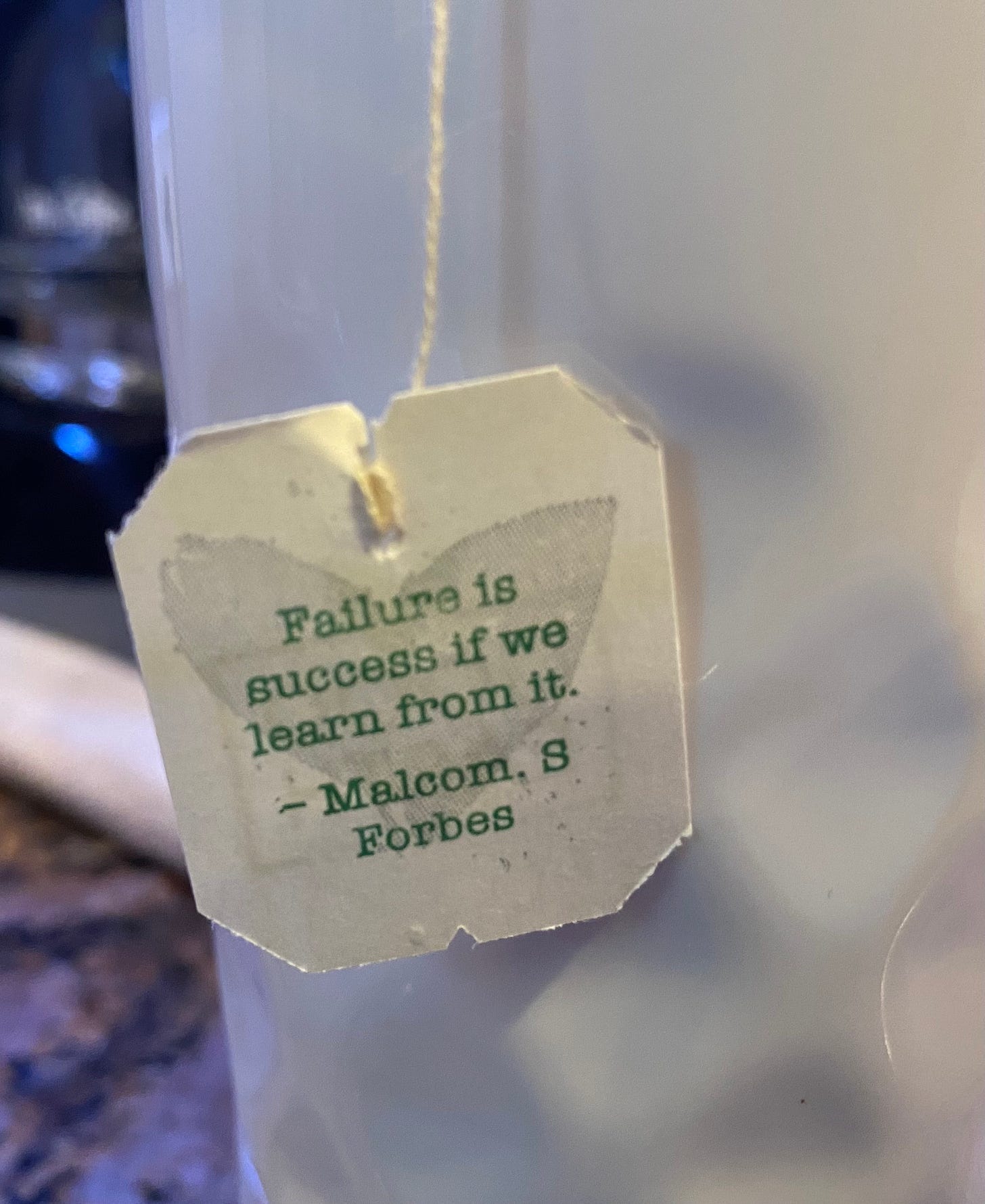A few weeks ago, I gave a presentation to young professionals about how to overcome Imposter Syndrome. The attendees shared that at one point or another they had all experienced feelings of inferiority or that they were a failure and someone would find out and expose them.
I assured the young professionals that they are not alone. In my experience as a coach working with leaders across many different professions, I’m struck by just how many of us feel inferior or fear failure—regardless of past success and current performance.
Fear is a terrifying feeling; it has the potential to block our creativity and ingenuity. At the root of this anxiety is a fear of failing or not being good enough. No one wants to fail. We all want to reach our goals and appear successful. And sometimes we get so focused on avoiding failure, we prevent ourselves from trying new things. So what if we redefined failure?
Last week I saw this quote on a tea bag:
This quote from Malcolm S. Forbes struck me as an empowering way to redefine failure. Sure, you might not have achieved what you’d initially defined as success. But any and every experience is an opportunity to improve ourselves, our process, and our outcomes.
Whenever I’m working with a client who is frustrated with something they perceive to be a failure, I help them shift into a more empowering mindset by asking them a few questions:
“What did you learn about yourself from this experience?”
“What will you do differently based on what you learned?”
“What are three positives you can find in this situation?”
These questions help them shift from a failure mindset to a success mindset. There’s no such thing as failure if you learned something.
The famed inventor and businessman Thomas Edison once observed, “I have not failed 10,000 times—I’ve successfully found 10,000 ways that will not work.” In other words, he learned something new every time he didn’t achieve the results he sought. There was no failure, just learning and growth. Edison’s mindset was that of growth and opportunity, not fear and lack.
This is such a tough concept for us to embrace because our culture wants to see immediate results. We’re taught to feel like we failed if we don’t deliver on the results we expected. This mindset causes so much pressure and anxiety. What if we embraced a learning mindset in the workplace, instead of telling people they failed?
We can still have high standards and clear expectations. Indeed, it’s important to set goals and visualize the outcome we want. But not if it means we limit ourselves for fear of criticism or reprisal. From a conscious leadership perspective, as long as we’re learning and growing, even the “failures” can turn into incredible lessons.
This week, consider the following questions:
What would happen if you changed how you typically define failure?
What kind of pressure would that relieve?
What kinds of opportunities would you pursue?
How can you help your team turn “failure” into a valuable lesson?
“There is only one thing that makes a dream impossible to achieve: the fear of failure.”
- Paulo Coelho
Work happy. Live happy. BE happy.
Meredith
P.S. Moving forward, you’ll have access to my weekly podcast! Paid subscribers will receive the podcast on Monday and receive exclusive content. Unpaid subscribers will receive the podcast later in the week. So you can listen to this newsletter if you don’t get a chance to read it on Tuesdays. Let me know what you think of the podcast!
The way we work and build teams is rapidly changing. Leaders often feel unprepared to navigate the transition. As a conscious leadership coach, consultant and communicator, Meredith helps leaders and their teams create new ways of working and relating so they can prepare for the future by consciously co-creating it.
Contact her to develop your conscious leadership and transform your organization into the workplace of the future.
You can support my work developing more conscious leadership in the world by investing in a paid subscription to this newsletter. Upgrade your subscription today!
Connect with Meredith on Instagram, Facebook, Twitter, and LinkedIn for content related to these topics.



